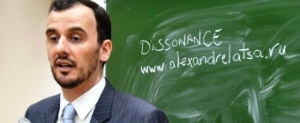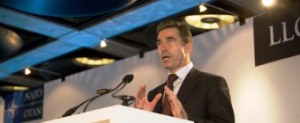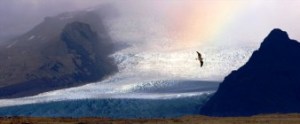Route magazine made an Interview from me, about the arctic, You can read it on their Website here.
*
We publish our exclusive interview on the Arctic affairs with Alexandre Latsa, French expert in geopolitics and author of “Putin’s New Russia”. The RIA Novosti News Agency contributor Alexandre Latsa analyzes the business prospects of the Northern Sea Route and assesses the possibility of Russia’s 2013 Arctic claim approval by the United Nations Commission on the Law of the Sea (UNCLOS).
Route Magazine: In your comprehensive review of Arctic affairs in 2011 you mentioned that Western scholars Mackinder and Spykman had an idée fixe of maintaining military presence in the High North. Today some experts claim the conflict potential in the Arctic is rather low, but NATO, nevertheless, is actively striving to sneak into the region on the pretext of “civilian SAR and natural disaster response”. In your opinion, what are the geopolitical goals of these maneuvers?
Alexandre Latsa: This geopolitical view on Eurasia appeared and was developed with one goal: to ensure control over Eurasian strategic transportation corridors and energy supply routes both in the South (the Caspian and the Black sea areas) and in the High North (the Arctic). This theory has gradually become a very important and pressing practical issue due to the fact that climate change will soon open the Northern Sea Route. The Arctic becomes the key region for the future of global energy policy. Just recently the EU delegation has led talks in Moscow with Russia and raised the question of the Arсtic. Mr. Alekperov, head of Lukoil oil company, said that Arctic’s oil reserve will help Russia to provide Europe in the nearest future.
Route Magazine: NATO’s “Cold Response-2012″ war games counted over 16300 troops from 15 nations. It was followed by an offensive show off in the north called Nordic Air Meet 2. The public would have never known about it unless a Norwegian C-130J plane crashed into Kebnekaise, a mountain in the northern Sweden, which is formally a neutral country. If the EU wants to trade, what is the driving force behind such irresponsible regional policy?
Alexandre Latsa: I think that the potential of tensions between the Western coalition and Russia never disappeared after the end of the World War II. I would say that in spite of “resets” and moments of mutual appreciation the contradictions remain and that these two entities are geostrategic competitors in some sense. This also happens because Europe is not an independent superpower as it should be. It could have balanced America’s influence in the Western world. Europe is unfortunately still under total US political and military control, mainly via NATO structures. So in fact I think all these events just show that the Western coalition wants to demonstrate to Russia that it won’t be able to do what it wants in the Arctic. We will probably see a subtle and extensive militarization of the Arctic in the short term.
Route Magazine: The Heritage Foundation in its report “NATO in the Arctic: Challenges and Opportunities” (2012) invited Canada and the United Kingdom to pursue NATO’s Arctic policy more actively. We all remember that Canada famously vetoed the Alliance’s first attempt in 2009 to enact an Arctic policy. Does it imply some differences of opinion among members of the Alliance concerning the Arctic?
Alexandre Latsa: I really do not think so. I think that these two countries that you’ve mentioned are very much concerned by what’s happening in the Arctic now. Canada can be seen as one of the most important Arctic players as well as Russia’s main competitor in the area. The United Kingdom is the key NATO member in the Western Europe. One has to remember that the UK is far from being considered Russia’s ally in Europe nowadays. The fact that the Heritage foundation is pushing in this direction does not surprise me at all. I believe there is a silent, but united political orientation. Have no illusions: there are very few political divisions among the Alliance’s members.
Route Magazine: Russia attracts Western investors to common energy projects in the Arctic. But the presence of a military factor always creates additional tension. What should we expect to see in the mid-term: realistic economic cooperation or continuing muscle-flexing by the West?
Alexandre Latsa: I am quite sure that Russian’s policy will focus on realistic economic cooperation and that they will find Western partners. The more the economic situation is getting worse in the US and Europe, the more the Europeans and Americans will have to be pragmatic and focus on common projects. I really do not think that the growing militarization can be a problem for Western investors. But sometimes political decisions just can’t be explained by purely economic reasons.
Route Magazine: Latest navigation season set a new record in the number of vessels via the Russia’s Northern Sea Route. Considering the political instability in Egypt around the Suez, do you forecast further increase in cargo flows in the Arctic Ocean?
Alexandre Latsa: Yes, I do. Today the Suez corridor is the shortest road from Asia to Europe and speaking about carrying trade, Chinese vessels more and more use it due to the growing volume of business between China and Europe. But have a look at the map and to compare: the road between Rotterdam and Tokyo takes 23.300 km via Panama, 21.100 km via Suez, and only 14.100 km via the Northern Sea Route. So even if we set aside all regional and global geopolitical tensions (war in the Middle East, revolution in Egypy etc.), the Northern Sea Route can definitely generate economic benefits. If we consider the high commercial potential of maritime trade between Europe and Asia via this route, we will see that it is possible to make a quite optimistic forecast.
Read more: “Economic Opportunities (and uncertainties) in the Arctic” by Felix H. Tschudi (Tschudi Shipping Company).
Route Magazine: What are the ambitions of the non-arctic states in the Far North? What do you think about Denmark’s decision to lobby Chinese interests in the Arctic Council?
Alexandre Latsa: Well, I think that all players noticed the growing geostrategic importance of this region, which contains 22% of planetary energy resources. If I’m not mistaken, China has already expressed its concern and interest about the Arctic. The non-arctic powers clearly understand that it is crucial to get a foothold in the Arctic if they want to play a key role in the future. China, for example, wishes to integrate in the Arctic Council with the help of its member states and rise to prominence in the region. By the way, it may become a big problem for the Alliance. The West fears to face a huge coalition of non-aligned countries in the future. This scenario has been evaluated by different analytic institutes, including, for example, the “North Institute”. It predicts an alliance between Russia and China in the Arctic.
Route Magazine: France enjoys observer status in the Arctic council. Its Representative Michel Rocard has been very active in promoting French interests. What are long-term strategic interests of France in the Arctic? Does France have a vision of national Arctic policy beyond the interests of NATO?
Alexandre Latsa: France is a non-arctic country that definitely intends to play a leading role in this region. France is an observer state in the Arctic council as well as in the Barents Euro-Arctic Council. Even if France decides to act only on the diplomatic and ecological level, the country is a member of NATO and of the EU, as well as a nuclear power. Due to this one can hardly imagine that France will stay out of the region in case of any kind of aggravation of international situation that could occur in the Arctic. So even if France does not have direct interests in the Arctic (as a non-coastal state), we have in my opinion strong ties with this territory because of our legal and supranational obligations and, of course, mostly because we are one of NATO’s stakeholders.
Route Magazine: Russia’s claim to a portion of the Arctic shelf would be filed with the United Nations Commission on the Law of the Sea by December 2013. In your opinion, will the Commission finally acknowledge Russia’s rights?
Alexandre Latsa: If it doesn’t happen, it would not only be unfair: it could even trigger some new tensions with Russia! During the Cold war, the military confrontation level in the Arctic was very high. It was the shortest road for the USSR and the USA to face each other in a military standoff. That’s why the Arctic became a geopolitical field of tension between the superpowers. Decades later we observe the situation and find that it did not undergo substantial transformation. The current political pressure in the Arctic proves that it has never been so important. All we can hope for is that this militarization and territorial misunderstandings won’t lead to any serious conflict and that we would peacefully enter the Age of the Arctic as it was predicted by Oran R.Young and Gail Osherenko in 1989.



